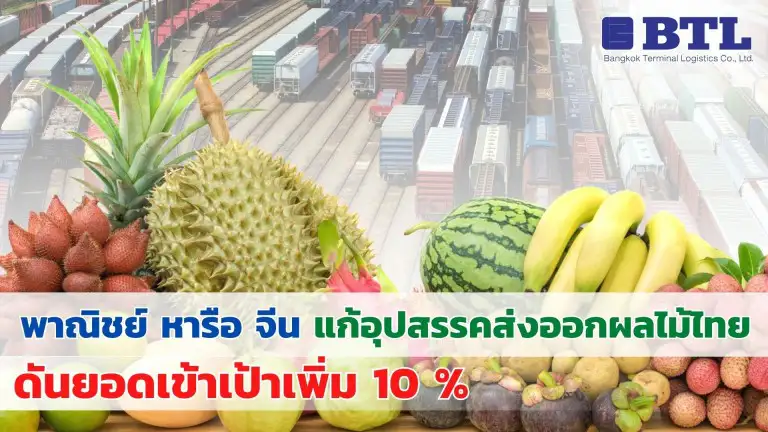Thai Ministry of Commerce Negotiates with China to Remove Obstacles in Fruit Exports, Aiming for a 10% Increase
May, 2 2023

China is Thailand’s most important fruit export market. In 2022, Thailand ranked as the top supplier of imported fruit to China, with an import volume of 2.17 million tons valued at 4.9 billion USD, an increase of 3.72% from the previous year.
Kunming, in Yunnan Province, serves as a key entry point for Thai fruits into China. In 2022, Thailand exported 276,000 tons of fruit to Kunming through three main routes:
- Air transport via airlines
- Land transport via Mohan border checkpoint
- Lao-China Railway (operational since November 2022)
The primary export route was through Mohan’s land checkpoint, which handled 270,000 tons of fruit shipments. Since its opening in November 2022, the Mohan railway checkpoint has facilitated 3,700 tons of fruit shipments.
To prepare for the upcoming fruit season, where Thai fruit production is expected to reach at least 6.78 million tons (a 3% increase from last year), the Ministry of Commerce led a delegation to Yunnan Province from March 27-29. Their goal was to assess the Mohan land and railway checkpoints, coordinate with Chinese customs authorities, and ensure smoother trade flow.
Thailand’s fruit exports to China previously faced significant delays due to China’s Zero-COVID policy, which required strict customs inspections at multiple border checkpoints. This led to long waiting times for fruit trucks at the Chinese border, causing fruit spoilage and losses for exporters.
Keerati Rushchano, Permanent Secretary of the Ministry of Commerce, highlighted that the Mohan land checkpoint originally operated with single-lane traffic, leading to congestion. During peak seasons, 500 trucks entered the checkpoint daily, and customs officers had to work until 8:00–9:00 PM to process shipments.
Now, China has introduced dual-lane traffic, greatly improving logistics efficiency. Additionally, Zero-COVID restrictions have been lifted, meaning truck drivers and goods no longer require nucleic acid testing.
The Mohan railway checkpoint is also fully operational for handling cold chain fruit imports. Currently, the Lao-China Railway runs seven freight trains per day, with designated inspection areas for fruits, grains, and frozen seafood, consisting of:
- 15 fruit inspection stations
- 7 grain inspection stations
- 4 frozen seafood inspection stations
Since the fruit inspection area opened in late 2022, 22 fruit shipments (157 containers, 3,675 tons) have been transported via the Lao-China Railway, including:
- Durian (4 containers)
- Longan (90 containers)
- Bananas (53 containers)
- Other fruits such as pomelos, coconuts, and mangoes (10 containers)
In April 2023, Thai officials visited Wangjiaying West Station in Kunming, where they met with Speed Inter Transport Co., Ltd. after the company successfully delivered 23 containers of Thai fruit via the Lao-China Railway, bypassing the Mohan land route.
The shipment included:
- 21 containers of durian
- 2 containers of mangosteen
Three containers were delivered to Jinma Zhengchang Market in Kunming, while the rest continued to Chongqing, Guangzhou, Chengdu, Changsha, and Jiaxing via truck transport.
China’s Subsidy for Lao-China Railway Transport
Since the Lao-China Railway began operations in late 2021, the Chinese government has provided logistics subsidies to Chinese transport companies. Depending on the product type, 40-50% of rail transport costs can be reimbursed.
- Durian shipments receive a 50% subsidy, making rail transport cost-competitive with trucking.
The rail transport time from Thailand to Kunming is approximately three days, making it a viable alternative to trucking for perishable fruits.
Since December 3, 2021, Wangjiaying West Station has handled:
- 5,600 import containers (mainly agricultural products and fruit)
- 9,600 export containers (textiles, chemical fertilizers, machinery, spare parts, and fresh vegetables)
Challenges and Future Plans
Keerati emphasized the need to resolve trade bottlenecks quickly to avoid disruption to Thai fruit exports.
However, rail transport costs remain higher than trucking, primarily due to loading and handling fees at the Lao-China railway terminal. Despite this, rail transport offers advantages such as faster delivery times and direct integration into China’s logistics network, which is crucial for perishable Thai fruit exports.
The issue of high railway transport costs requires further negotiations between Laos and China to reach cost reductions in the future.
For 2023, the Ministry of Commerce aims to increase fresh fruit exports to China by 10%, targeting 4.287 billion USD in exports. If logistics bottlenecks are resolved, Mohan Railway Checkpoint could become a key trade gateway, helping Thailand stay competitive in China’s increasingly crowded fruit market.